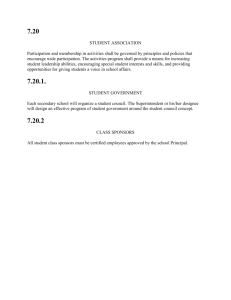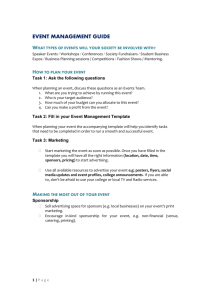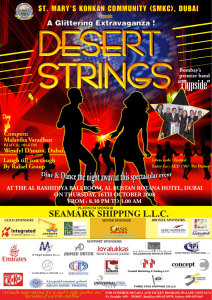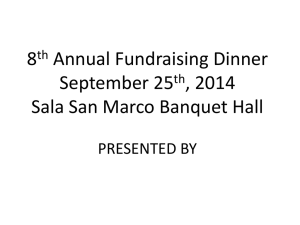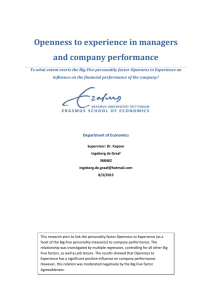Design Template (DOC) - University of North Texas
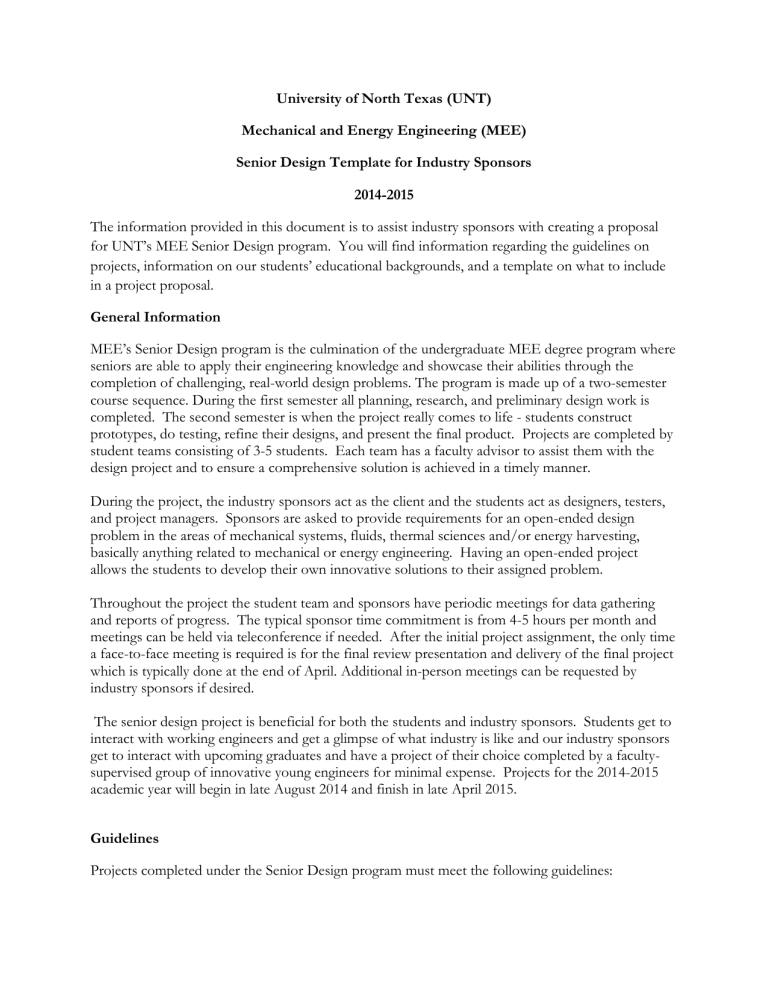
University of North Texas (UNT)
Mechanical and Energy Engineering (MEE)
Senior Design Template for Industry Sponsors
2014-2015
The information provided in this document is to assist industry sponsors with creating a proposal for UNT’s MEE Senior Design program. You will find information regarding the guidelines on projects, information on our students’ educational backgrounds, and a template on what to include in a project proposal.
General Information
MEE’s Senior Design program is the culmination of the undergraduate MEE degree program where seniors are able to apply their engineering knowledge and showcase their abilities through the completion of challenging, real-world design problems. The program is made up of a two-semester course sequence. During the first semester all planning, research, and preliminary design work is completed. The second semester is when the project really comes to life - students construct prototypes, do testing, refine their designs, and present the final product. Projects are completed by student teams consisting of 3-5 students. Each team has a faculty advisor to assist them with the design project and to ensure a comprehensive solution is achieved in a timely manner.
During the project, the industry sponsors act as the client and the students act as designers, testers, and project managers. Sponsors are asked to provide requirements for an open-ended design problem in the areas of mechanical systems, fluids, thermal sciences and/or energy harvesting, basically anything related to mechanical or energy engineering. Having an open-ended project allows the students to develop their own innovative solutions to their assigned problem.
Throughout the project the student team and sponsors have periodic meetings for data gathering and reports of progress. The typical sponsor time commitment is from 4-5 hours per month and meetings can be held via teleconference if needed. After the initial project assignment, the only time a face-to-face meeting is required is for the final review presentation and delivery of the final project which is typically done at the end of April. Additional in-person meetings can be requested by industry sponsors if desired.
The senior design project is beneficial for both the students and industry sponsors. Students get to interact with working engineers and get a glimpse of what industry is like and our industry sponsors get to interact with upcoming graduates and have a project of their choice completed by a facultysupervised group of innovative young engineers for minimal expense. Projects for the 2014-2015 academic year will begin in late August 2014 and finish in late April 2015.
Guidelines
Projects completed under the Senior Design program must meet the following guidelines:
The design project must be related to mechanical and/or energy engineering. The project should be the design of a device, machine or system that is mechanical, thermal, energybased or fluids-based. The project must have a broad enough scope that it demonstrates a student’s knowledge of mechanical and energy fundamentals.
Projects may include non-mechanical portions such as control and feedback electronics and instrumentation.
Projects must be open-ended. Having many possible solutions allows teams to determine the best solution and provide reasoning behind their selection.
Design projects must be complex enough so that the project can be broken up to allow for each of the 3-5 team members to have a component/system to design.
Projects must be able to be completed by the end of the 2015 Spring Semester, roughly the last week of April 2015.
Students’ Course Backgrounds
The students in Senior Design have completed the following course requirements:
Physics I/II
Chemistry for Engineers
Math up through Differential Equations – includes Linear Algebra
Analytical Methods – consists of Numerical Analysis, Statistics, and Vector Calculus
Thermodynamics I/II
Fluid Mechanics
Heat Transfer
System Dynamics and Controls
Circuits
Machine Elements
C++
Engineering Graphics – Pro/ENGINEER
MEE Lab coursework
In addition to these courses, many students have engineering co-op/internship experience which gives them previous hands-on experience with tools used in a professional engineering setting.
Proposal Template
This template on the following page is meant to serve as a guide in creating a project proposal.
Additional information can be added if desired. The purpose of the proposal is to allow the Senior
Design coordinator to judge whether the project will be a good fit for our students and also, to give the students an idea of what will be expected of them should they select the project.
UNT MEE Senior Design Proposal
Company Name:_________________________________
Company Contact:________________________________
Contact Phone:_______________________ Contact Email:_____________________________
Objective: Please briefly discuss the objective of the proposed project. What problem needs to be solved and why?
Constraints/Specifications: Describe the constraints the students will encounter on the design problem. Are there certain specifications that must be met by the design? If so, what are they?
Desired Approaches/Experiments: Briefly discuss any approaches and/or experiments you feel will be required for the completion of this project?
Team Size: How many students do you think this project will require? It should be noted that a larger scope project could be broken into 2 or more projects if required. Student teams are limited to
3-5 members.
Deliverables: Describe the deliverables you expect at the completion of this project. Examples would be prototypes, engineering drawings, and reports.
Level of Sponsorship: Discuss the sponsorship your company will be providing to the team. Will be you be providing materials, work space, equipment, monetary assistance or anything similar? Will a mentor from your company be available to assist the students if needed?
Once you have completed your proposal, please email it to Dr. Cherish Qualls at cherish.qualls@unt.edu
. After receiving your information, you will be contacted to set up an initial discussion meeting.
If you require any additional information, please do not hesitate to contact Dr. Cherish Qualls at cherish.qualls@unt.edu
or 940-565-3446. Thank you for your time and interest!
